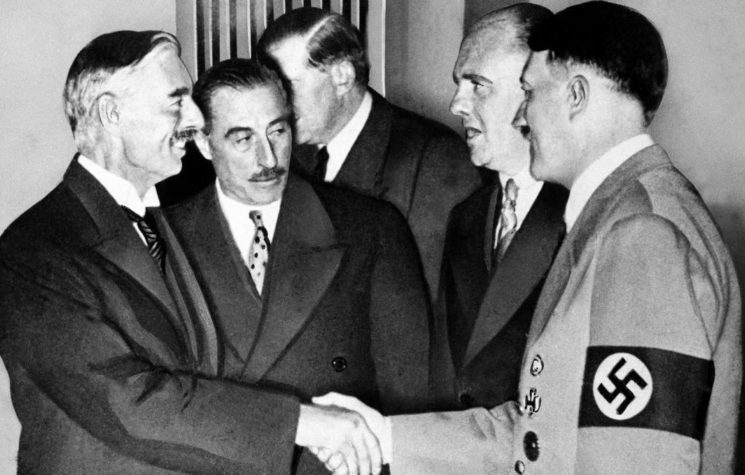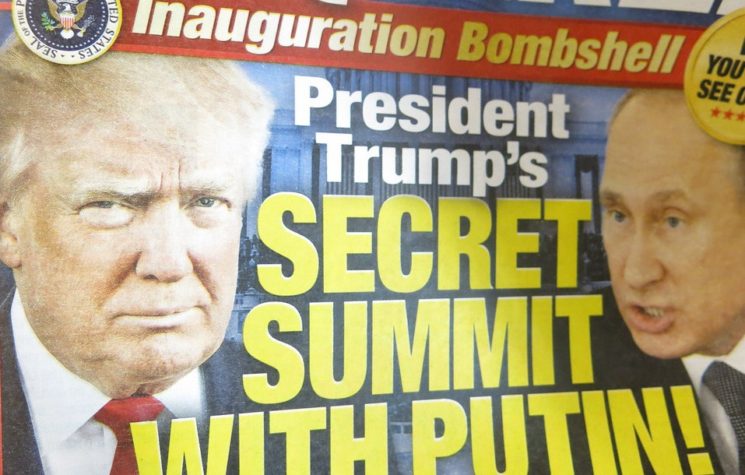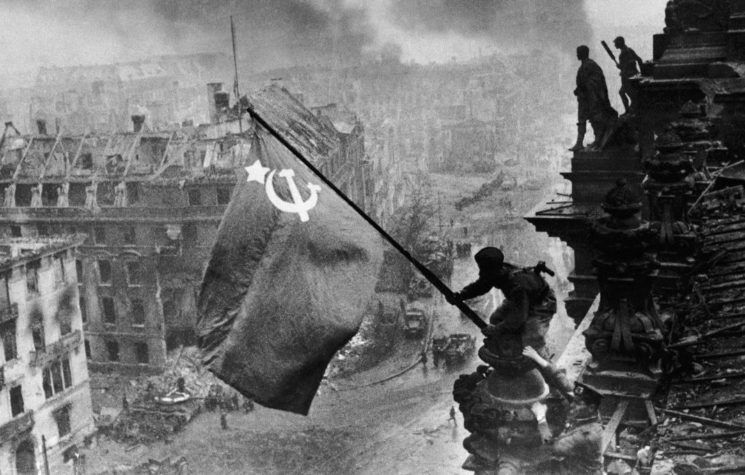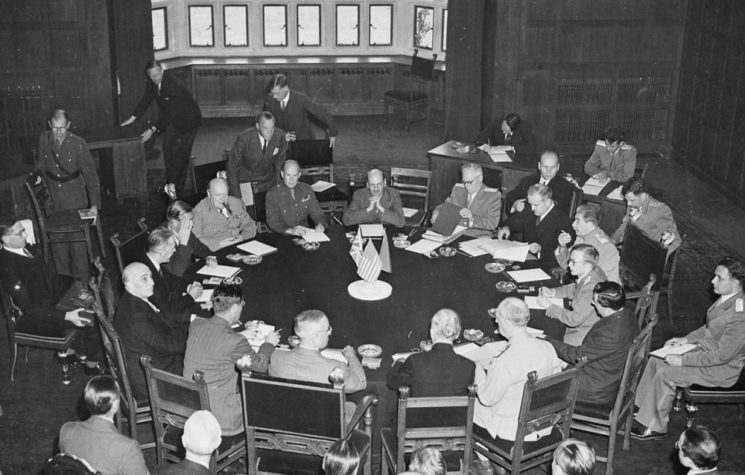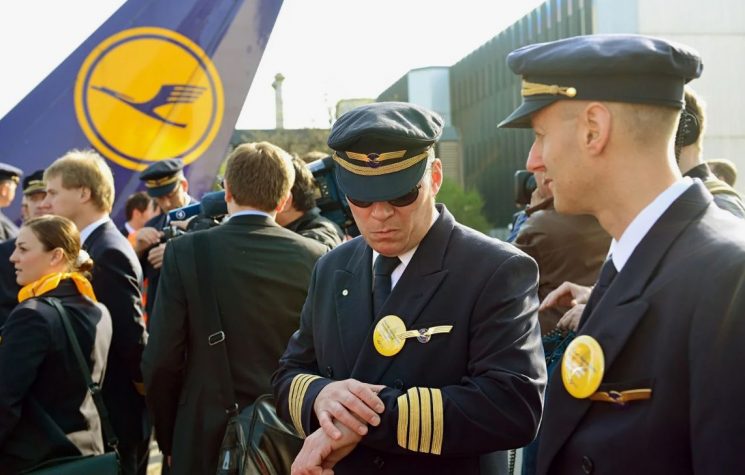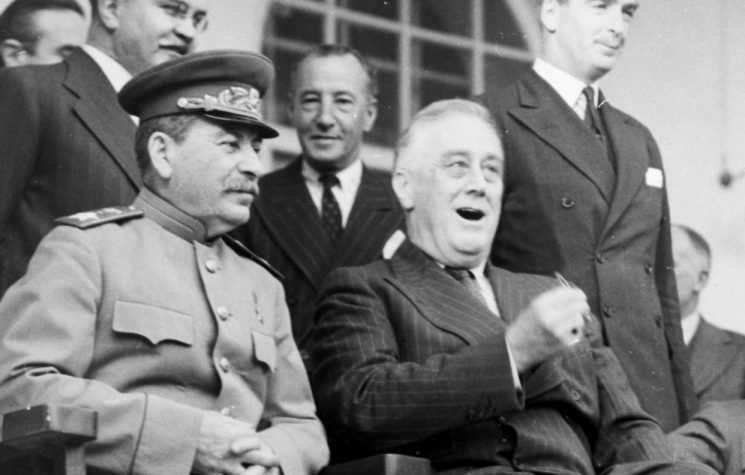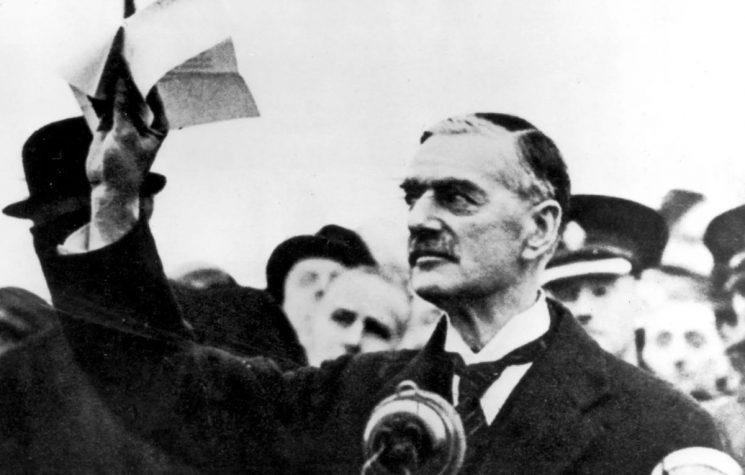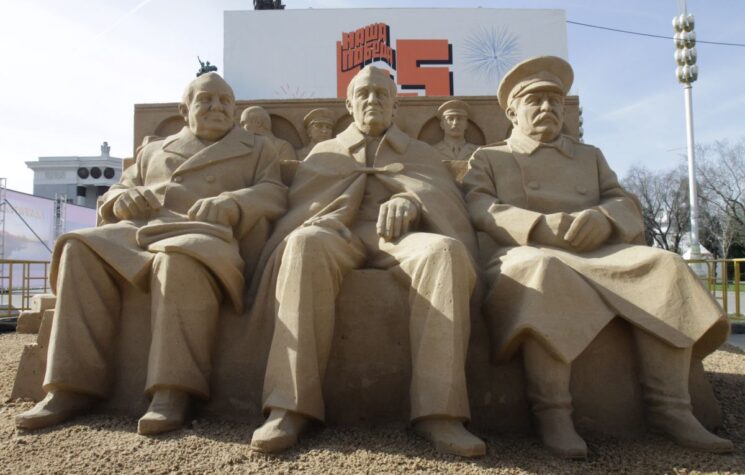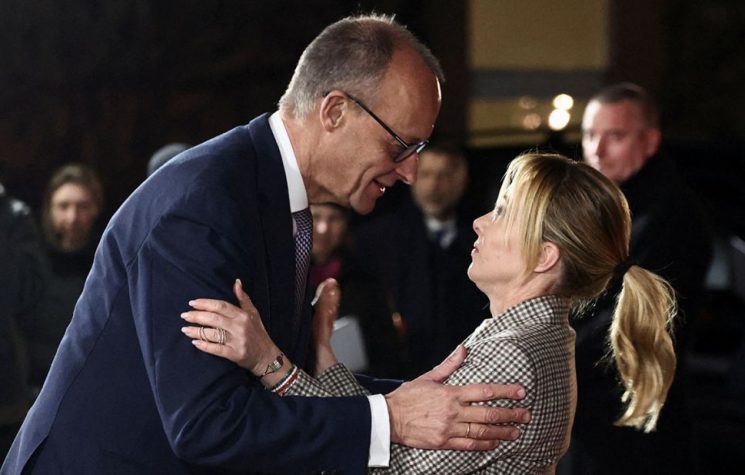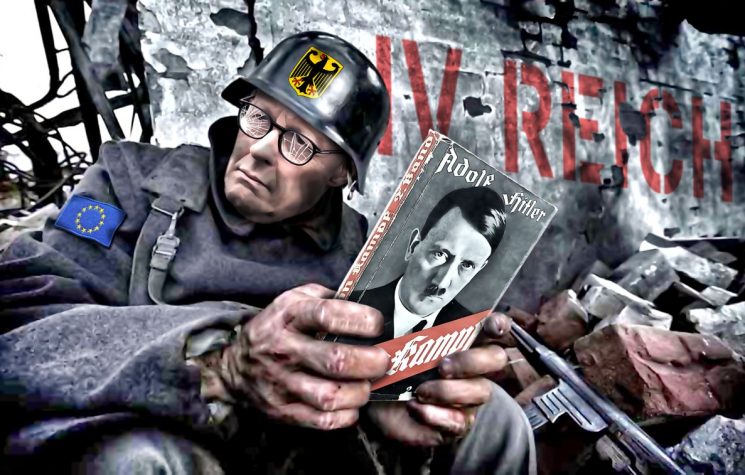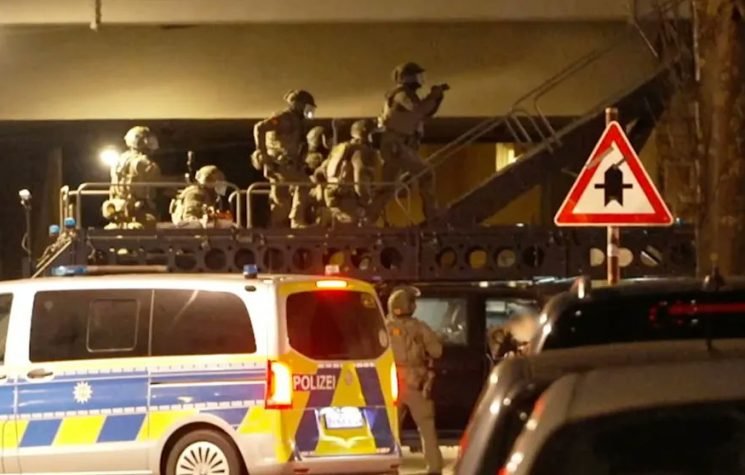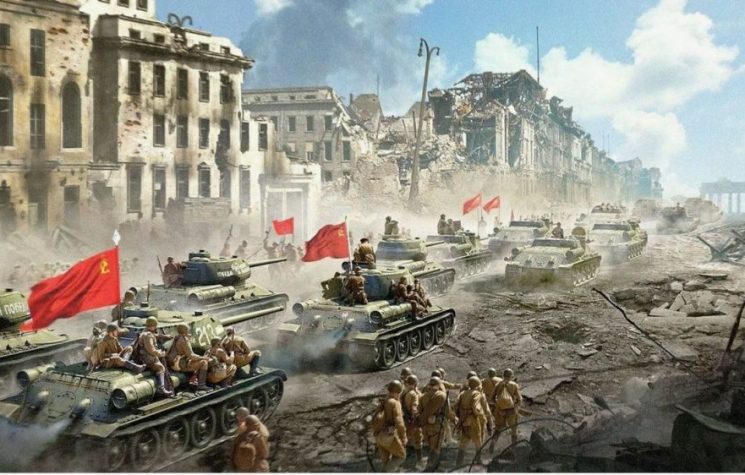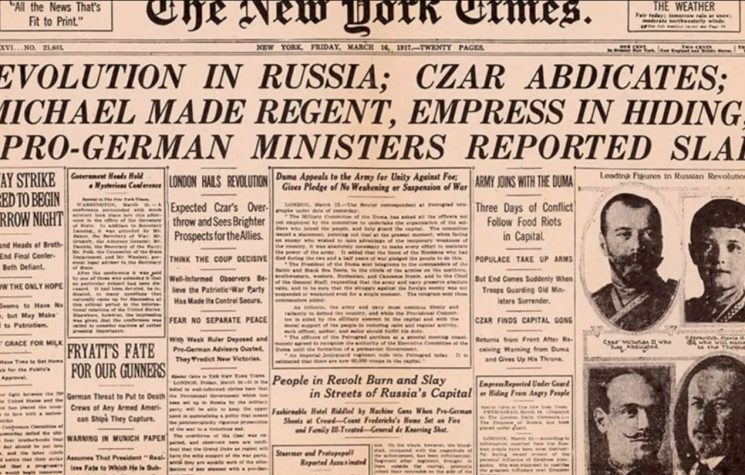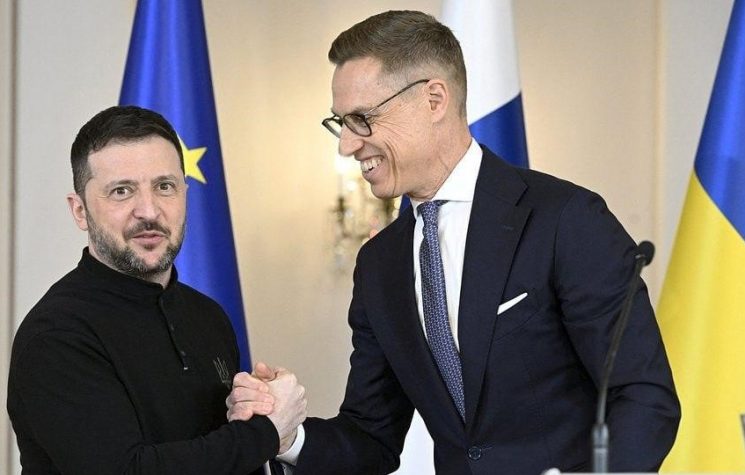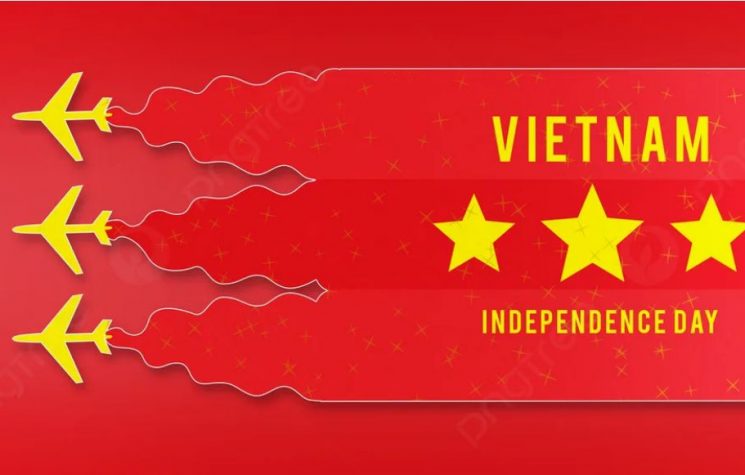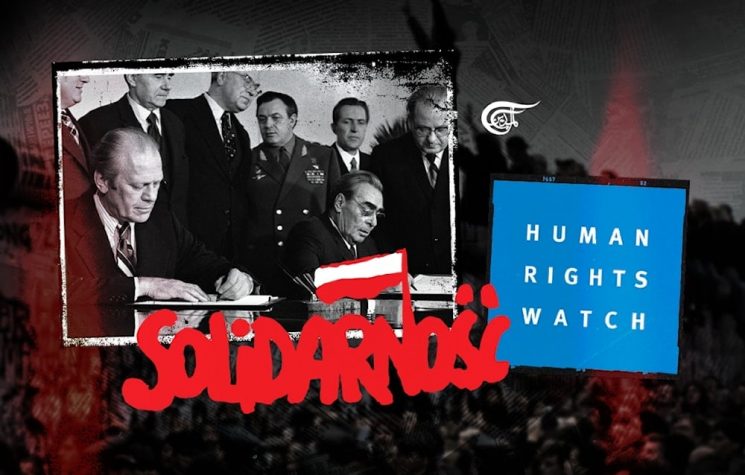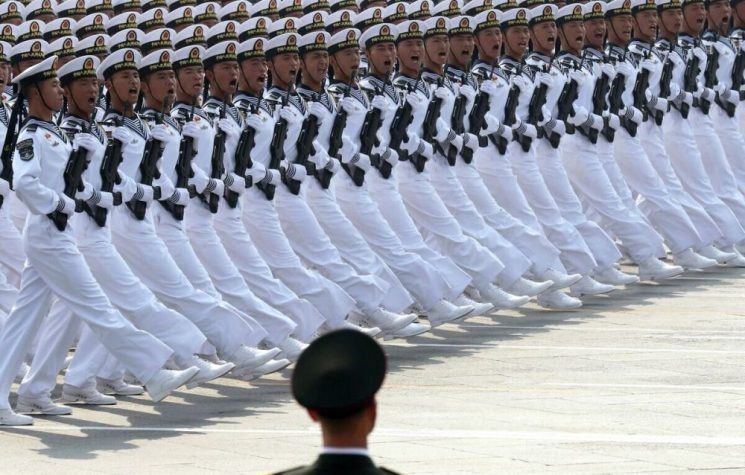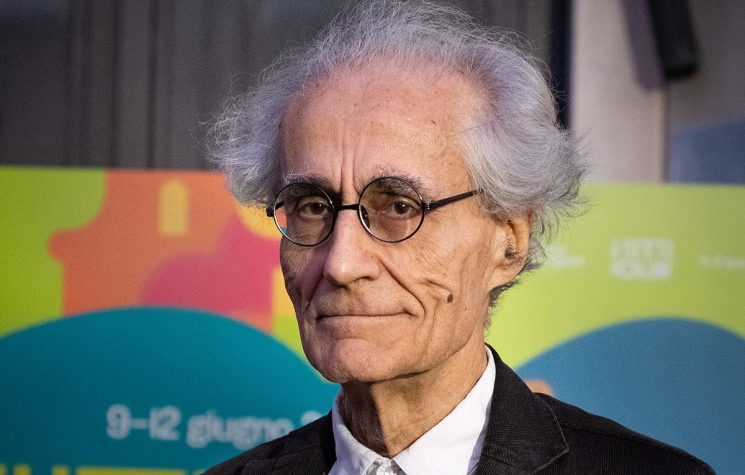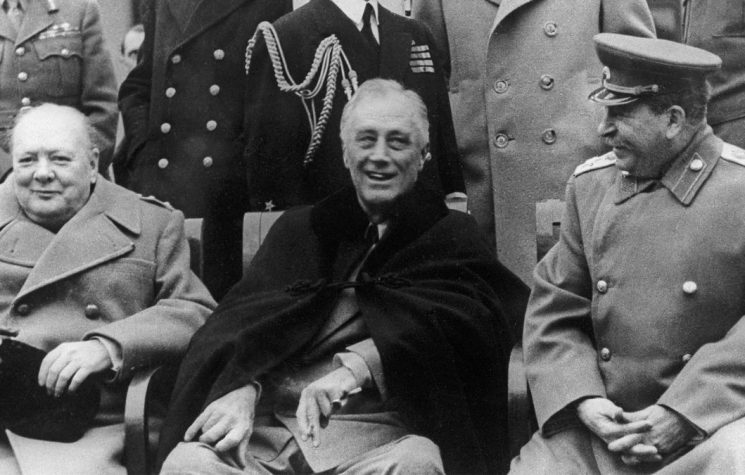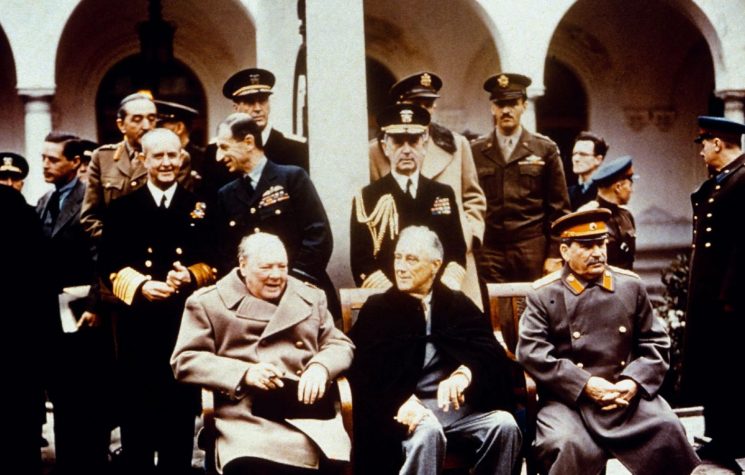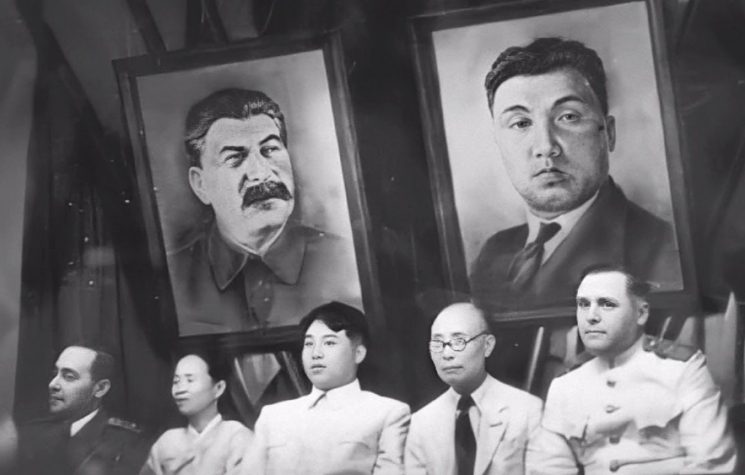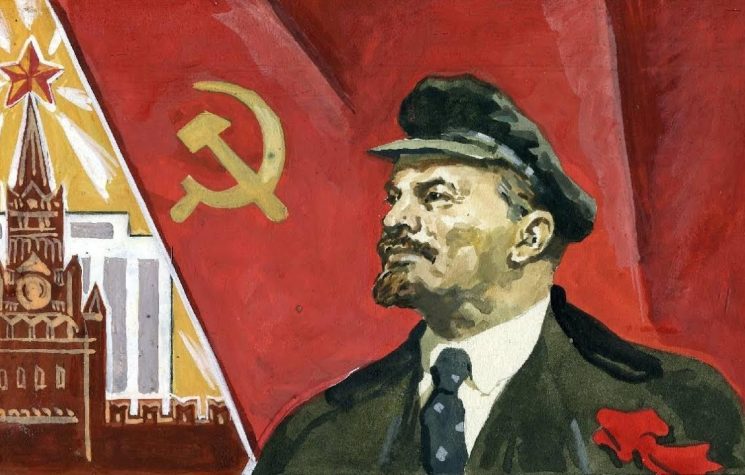On August 23rd the Canadian Prime Minister’s office issued a statement to remember the so-called “black ribbon day,” a bogus holiday established in 2008-2009 by the European Parliament to commemorate the victims of fascist and communist “totalitarianism” and the signing of the Molotov-Ribbentrop non-aggression pact in 1939. Various centre-right political groupings inside the European Parliament, along with the NATO (read US) Parliamentary Assembly initiated or backed the idea. In 2009, the Organisation for Security and Cooperation in Europe, meeting in Lithuania, also passed a resolution “equating the roles of the USSR and Nazi Germany in starting World War II.”
Prime Minister Justin Trudeau’s statement follows along similar lines. Here is an excerpt: “Black Ribbon Day marks the sombre anniversary of the Molotov-Ribbentrop Pact. Signed between the Soviet Union and Nazi Germany in 1939 to divide Central and Eastern Europe, the infamous pact set the stage for the appalling atrocities these regimes would commit. In its wake, they stripped countries of their autonomy, forced families to flee their homes, and tore communities apart, including Jewish and Romani communities, and others. The Soviet and Nazi regimes brought untold suffering upon people across Europe, as millions were senselessly murdered and denied their rights, freedoms, and dignity [italics added].”
As a statement purporting to summarise the origins and unfolding of the Second World War, it is a parody of the actual events of the 1930s and war years. It is politically motivated “fake history”; it is in fact a whole cloth of lies.
Let’s start at the beginning. In late January 1933 President Paul von Hindenburg, appointed Adolf Hitler as German chancellor. Within months Hitler’s government declared illegal the German Communist and Socialist parties and commenced to establish a one party Nazi state. The Soviet government had heretofore maintained tolerable or correct relations with Weimar Germany, established through the treaty of Rapallo in 1922. The new Nazi government however abandoned that policy and launched a propaganda campaign against the Soviet Union and against its diplomatic, trade, and business representatives working in Germany. Soviet business offices were sometimes trashed and their personnel roughed up by Nazi hooligans.

Soviet Commissar for Foreign Affairs, Maksim M. Litvinov
Alarm bells went off in Moscow. Soviet diplomats and notably the Commissar for Foreign Affairs, Maksim M. Litvinov, had read Hitler’s Mein Kampf, his blueprint for the German domination of Europe, published in the mid-1920s. The book became a bestseller in Germany and was a necessary addition to the mantel piece or the living room table in any German home. For those of you who may not know, Mein Kampf identified Jews and Slavs as Untermenschen, sub humans, good only for slavery or death. The Jews were not to be the only targets of Nazi genocide. Soviet territories eastward to the Ural Mountains were to become German. France was also named as a habitual enemy which had to be eliminated.
“What about Hitler’s book?” Litvinov often asked German diplomats in Moscow. Oh that, they said, don’t pay it any mind. Hitler doesn’t really mean what he wrote. Litvinov smiled politely in reaction to such statements, but did not believe a word of what he heard from his German interlocutors.
In December 1933 the Soviet government established officially a new policy of collective security and mutual assistance against Nazi Germany. What did this new policy mean exactly? The Soviet idea was to re-establish the World War I anti-German entente, to be composed of France, Britain, the United States, and yes, even fascist Italy. Although not stated publically, it was a policy of containment and preparation for war against Nazi Germany should containment fail.
In October 1933 Litvinov went to Washington to settle the terms of US diplomatic recognition of the USSR. He had discussions with the new US president, Franklin D. Roosevelt, about collective security against Imperial Japan and Nazi Germany. Iosif Stalin, Litvinov’s boss in Moscow, gave his approval to these discussions. Soviet-US relations were off to a good start, but in 1934 the State Department—almost to a man, anti-communists—sabotaged the rapprochement launched by Roosevelt and Litvinov.
At the same time Soviet diplomats in Paris were discussing collective security with the French foreign minister, Joseph Paul-Boncour. In 1933 and 1934 Paul-Boncour and his successor Louis Barthou strengthened ties with the USSR. The reason was simple: both governments felt threatened by Hitlerite Germany. Here too promising Franco-Soviet relations were sabotaged by Pierre Laval, who succeeded Barthou after the latter was killed in Marseilles during the assassination of the Yugoslav King Alexander I in October 1934. Laval was an anti-communist who preferred a rapprochement with Nazi Germany to collective security with the USSR. He gutted a Franco-Soviet mutual assistance pact which was finally signed in May 1935 only to delay its ratification in the French National Assembly. I call the pact the coquille vide, or empty shell. Laval lost power in January 1936 but the damage had been done. After the fall of France in 1940, Laval became a Nazi collaborator and was shot for treason in the autumn of 1945.
In Britain too Soviet diplomats were active and sought to launch an Anglo-Soviet rapprochement. Its aim was to establish the base for collective security against Nazi Germany. Here too the policy was sabotaged, first by the conclusion of the Anglo-German naval agreement in June 1935. This was a bilateral pact on German naval rearmament. The Soviet and French governments were stunned and considered the British deal with Germany to be a betrayal. In early 1936 a new British Foreign Secretary, Anthony Eden, put a stop to the rapprochement because of communist “propaganda”. Soviet diplomats thought Eden was a “friend”. He was nothing of the sort.

Fascism represented force, power, and masculinity for European elites who often doubted themselves and feared communism
In each case, the United States, France, and Britain halted promising discussions with the Soviet Union. Why would these governments do something so seemingly incomprehensive in hindsight? Because anti-communism and Sovietophobia were stronger motives amongst the US, French, and British governing elites than the perception of danger from Nazi Germany. On the contrary, these elites in large measure were sympathetic to Hitler. Fascism was a bulwark mounted in defence of capitalism, against the spread of communism and against the extension of Soviet influence into Europe. The great question of the 1930s was “who is enemy no. 1”, Nazi Germany or the USSR? All too often these elites, not all, but the majority, got the answer to that question wrong. They preferred a rapprochement with Nazi Germany to collective security and mutual assistance with the USSR. Fascism represented force, power, and masculinity for European elites who often doubted themselves and feared communism. Leather uniforms, the odor of sweat from tens of thousands of marching fascists with their drums, banners, and torches were like aphrodisiacs for elites unsure of their own virility and of their security against the growth of Soviet influence. The Spanish civil war, which erupted in July 1936, polarised European politics between right and left and rendered impossible mutual assistance against Germany.
Italy was a peculiar case. The Soviet government maintained tolerable relations with Rome even though Italy was fascist and Russia, a communist state. Italy had fought on the side of the Entente during World War I and Litvinov wanted to keep it on side in the new coalition he was trying to build. Benito Mussolini had colonial ambitions in East Africa, however, launching a war of aggression against Abyssinia, the last parcel of African territory which had not been colonised by the European powers. To make a long story short, the Abyssinian crisis was the beginning of the end of Litvinov’s hopes to keep Italy on side.
In Romania too Soviet diplomats had some early successes. The Romanian foreign minister, Nicolae Titulescu, favoured collective security and worked closely with Litvinov to improve Soviet-Romanian relations. It was Titulescu who backed Litvinov in trying to obtain agreement with France in 1935 for a pact of mutual assistance in spite of Laval’s conniving and bad faith. Between Titulescu and Litvinov there were discussions about mutual assistance. These too came to nothing. Romania was dominated by a far right elite which disapproved of better Soviet relations. In August 1936 Titulescu found himself politically isolated and was compelled to resign. He spent much of his time abroad because he feared for his life in Bucharest.

British Prime Minister Neville Chamberlain
In Czechoslovakia, Eduard Beneš, like Titulescu, favoured collective security against the Nazi menace. In May 1935 Beneš, the Czechoslovak president, signed a mutual assistance pact with the USSR, but he weakened it to avoid going beyond the scope of the Soviet pact with France, sabotaged by Laval. The Czechoslovaks feared Nazi Germany, and rightly so, but they would not ally closely with the USSR without the full backing of Britain and France, and this they would never obtain.
Czechoslovakia and Romania looked to a strong France and would not go beyond French commitments to the USSR. France looked to Britain. The British were the key, if they were ready to march, ready to ally themselves with the USSR, everyone else would fall into line. Without the British—who would not march—everything fell apart.
The Soviet Union also tried to improve relations with Poland. Here too Soviet diplomats failed when the Polish government signed a non-aggression pact with Nazi Germany in January 1934. The Polish elite never hid its preference for a rapprochement with Germany rather than for better relations with the USSR. The Poles became spoilers of collective security sabotaging Soviet attempts to organise an anti-German entente. They were at their worst in 1938 as Nazi accomplices in the dismemberment of Czechoslovakia before they became victims of Nazi aggression in 1939. Soviet diplomats repeatedly warned their Polish counterparts that Poland was headed to its doom if it did not change policy. Germany would turn on them and crush them when the time was right. The Poles laughed at such warnings, dismissed them out of hand. Russians are “barbarians”, they said, the Germans, a “civilised” people. The choice between the two was easy to make.
Let me be clear here. The archival evidence leaves no doubts, the Soviet government offered collective security and mutual assistance to France, Britain, Poland, Romania, Czechoslovakia, even fascist Italy, and in every case their offers were rejected, indeed spurned contemptuously in the case of Poland, the great spoiler of collective security in the lead-up to war in 1939. In the United States, the State Department sabotaged improving relations with Moscow. In the autumn of 1936, all Soviet efforts for mutual assistance had failed, and the USSR found itself isolated. No one wanted to ally with Moscow against Nazi Germany; all the above mentioned European powers conducted negotiations with Berlin to lure the wolf away from their doors. Yes, even the Czechoslovaks. The idea, both stated and unstated, was to turn Hitler’s ambitions eastward against the USSR.

Munich: selling out your friends to buy off your enemies
Then came the Munich betrayal in September 1938. Britain and France sold out the Czechoslovaks to Germany. “Peace in our time,” Neville Chamberlain, the British prime minister, declared. Czechoslovakia was dismembered to buy “peace” for France and Britain. Poland got a modest share of the booty as part of the dirty deal. “Jackals,” Winston Churchill called the Poles. In February 1939 the Manchester Guardian called Munich, selling out your friends to buy off your enemies. That description is apt.
In 1939 there was one last chance to conclude an Anglo-Franco-Soviet pact of mutual assistance against Nazi Germany. I call it the “alliance that never was”. In April 1939 the Soviet government offered France and Britain a political and military alliance against Nazi Germany. The terms of the alliance proposal were submitted on paper to Paris and London. In the spring of 1939 war looked inevitable. Rump Czechoslovakia had disappeared in March, gobbled up by the Wehrmacht without a shot fired. Later that month Hitler claimed the German populated Lithuanian city of Memel. In April a Gallup poll in Britain showed massive popular support for a Soviet alliance. In France too public opinion backed an alliance with Moscow. Churchill, then a Conservative backbencher, declared in the House of Commons that without the USSR there could be no successful resistance against Nazi aggression.
Logically, you would think that the French and British governments would have seized Soviet offers with both hands. It did not happen. The Foreign Office rejected the Soviet alliance proposal with the French grudgingly trailing behind. Litvinov was sacked as commissar and replaced by Viacheslav M. Molotov, Stalin’s right arm. For a time Soviet policy continued unchanged. In May Molotov sent a message to Warsaw that the Soviet government would support Poland against German aggression if so desired. Incredible as it may seem, on the very next day, the Poles declined Molotov’s proffered hand.

The Foreign Office rejected the Soviet alliance proposal with the French grudgingly trailing behind
In spite of the initial British rejection of Soviet proposals, Anglo-Franco-Soviet negotiations continued through the summer months of 1939. At the same time however British officials got caught negotiating with the Germans in search of a détente of the last hour with Hitler. It became public news in the British papers at the end of July as the British and French were preparing to send military missions to Moscow to conclude an alliance. The news caused a scandal in London and raised understandable Soviet doubts about Anglo-French good faith. It was then that Molotov began to show an interest in German overtures for an agreement.
There was more scandal to come. The Anglo-French military missions traveled to Moscow on a slow chartered merchantman making a top speed of thirteen knots. One Foreign Office official had proposed sending the missions in a fleet of fast British cruisers to make a point. The Foreign Secretary, Edward Lord Halifax, thought that idea was too provocative. So the French and British delegations went on a chartered merchantman and took five days to get to the USSR. Five days mattered when war could break out at any moment.
Could the situation become any more tragic, any more a farce? Indeed it could. The British chief negotiator, Admiral Sir Reginald Drax, had no written powers to sign an agreement with the Soviet side. His French counterpart, General Joseph Doumenc, had a vague letter of authority from the French président du Conseil. He could negotiate but not sign an agreement. Doumenc and Drax were supernumeraries. On the other hand, the Soviet side was represented by its commissar for war with full plenipotentiary powers. “All indications so far go to show,” advised the British ambassador in Moscow, “that Soviet military negotiators are really out for business.” In contrast, formal British instructions were to “go very slowly”. When Drax met the Foreign Secretary Halifax before leaving for Moscow, he asked about the “possibility of failure” in the negotiations. “There was a short but impressive silence,” according to Drax, “and the Foreign Secretary then remarked that on the whole it would be preferable to draw out the negotiations as long as possible.” Doumenc remarked that he had been sent to Moscow with “empty hands.” They had nothing to offer their Soviet interlocutors. The British could send two divisions to France at the outset of a European war. The Red Army could immediately mobilise one hundred divisions, and Soviet forces had just thrashed the Japanese in heavy fighting on the Manchurian frontier. What the hell? “They are not serious,” Stalin concluded. And he was right. The French and British governments thought they could play Stalin for a fool. That was a mistake.
After the bad faith, after all the conniving, what would you have done in Stalin’s boots, or any Russian leader’s boots? Take the Poles, for example, they worked against Soviet diplomacy in London, Paris, Bucharest, Berlin, even Tokyo… anywhere they could put a spoke in the Soviet wheel. They shared with Hitler in the spoils of Czechoslovak dismemberment. In 1939 they attempted until the last moment to sidetrack an anti-Nazi alliance in which the USSR was a signatory. I know, it is all too incredible to believe, like an implausible story line in a bad novel, but it was true. And then the Poles had the temerity to accuse the Soviet side of stabbing them in the back. It was Satan rebuking sin. The Polish governing elite brought ruin upon itself and its people. Even today it is the same old Poland. The Polish government is marking the beginning of the Second World War by inviting to Warsaw the former Axis powers, but not the Russian Federation, even though it was the Red Army which liberated Poland at high cost in dead and wounded. This is a fact of history which Polish nationalists simply cannot bear to hear and which they seek to erase from our memories.

The French and British governments thought they could play Stalin for a fool. That was a mistake
After nearly six years of trying to create a broad anti-German entente in Europe, notably with Britain and France, the Soviet government had nothing to show for its efforts. Nothing. By late 1936 the USSR was effectively isolated, and still Soviet diplomats tried to obtain agreement with France and Britain. The British and French, and the Romanians, and even the Czechoslovaks, and especially the Poles sabotaged, spurned or dodged Soviet offers, weakened agreements with Moscow and tried themselves to negotiate terms with Berlin to save their own skins. It was like they were doing Moscow a favour by humoring, with polite, knowing smiles, Soviet diplomats who talked about Mein Kampf and warned of the Nazi danger. The Soviet government feared being left in the lurch to fight the Wehrmacht alone while the French and the British sat on their hands in the west. After all, this is exactly what the French and British did while Poland collapsed at the beginning of September in a matter of days at the hands of the invading Wehrmacht. If France and Britain would not help Poland, would they have done more for the USSR? It is a question which Stalin and his colleagues most certainly asked themselves.
The Molotov-Ribbentrop pact was the result of the failure of nearly six years of Soviet effort to form an anti-Nazi alliance with the western powers. The pact was ugly. It was Soviet sauve qui peut, and it contained a secret codicil which foresaw the creation of “spheres of influence” in Eastern Europe “in the event of… territorial and political rearrangement[s]”. But it was not worse than what the French and British had done at Munich. “C’est la réponse du berger à la bergère, the French ambassador in Moscow remarked, what’s sauce for the goose is sauce for the gander. The dismemberment of Czechoslovakia was the precedent for what then followed. As the late British historian A.J.P. Taylor so aptly put it long ago: violent western reproaches against the USSR “came ill from the statesmen who went to Munich…. The Russians, in fact, did only what the Western statesmen had hoped to do; and Western bitterness was the bitterness of disappointment, mixed with anger that professions of Communism were no more sincere than their own professions of democracy [in dealing with Hitler].”
There then occurred a period of Soviet appeasement of Hitlerite Germany no more attractive than the Anglo-French appeasement which preceded it. And Stalin made a huge miscalculation. He disregarded his own military intelligence warning of a Nazi invasion of the USSR. He thought Hitler would not be such a fool as to invade the Soviet Union while Britain was still a belligerent power. How wrong he was. On 22 June 1941 the Axis powers invaded the Soviet Union with a huge military force along a front from the Baltic to the Black Seas.
It was the beginning of the Great Patriotic War, 1418 days of the most horrendous, intense violence. The USSR allied, finally, with Britain and the United States against Hitlerite Germany. It was the so-called Grand Alliance. France of course had disappeared, crushed by the German army in a military debacle in May 1940. During the first three years of fighting from June 1941 until June 1944, the Red Army fought nearly alone against the Nazi Wehrmacht. How ironic. Stalin had done all he could to avoid facing Hitlerite Germany alone, and yet there he was, the Red Army fighting nearly alone against the Wehrmacht and Axis Powers. The tide of battle turned at Stalingrad, sixteen months before the western allies landed in Normandy. Here is what President Roosevelt wrote to Stalin on 4 February 1943, the day after the last German forces surrendered in Stalingrad. “As Commander-in-Chief of the Armed Forces of the United States of America, I congratulate you on the brilliant victory at Stalingrad of the armies under your Supreme Command. The 162 days of epic battle for the city which has for ever honored your name and the decisive result which all Americans are celebrating today will remain one of the proudest chapters in this war of the peoples united against Nazism and its emulators. The commanders and fighters of your armies at the front and the men and women, who have supported them, in factory and field, have combined not only to cover with glory their country’s arms, but to inspire by their example fresh determination among all the United Nations to bend every energy to bring about the final defeat and unconditional surrender of the common enemy.” As Churchill put it to Roosevelt at about the same time: “Listen, who is really fighting today? Stalin alone! And look how he is fighting…” Yes, indeed, we should not, even now, forget how the Red Army fought.
From June 1941 until September 1943 there was not a single US, British, or Canadian division fighting on the ground of continental Europe, not one. The fighting in North Africa was a sideshow where Anglo-American forces faced two German divisions when more than two hundred German divisions were arrayed on the Soviet Front. The Italian campaign which began in September 1943 was a fiasco tying down more Allied divisions than German. When the western allies finally arrived in France, the Wehrmacht was a beaten-up shadow of what it had been when German soldiers stepped across Soviet frontiers in June 1941. Normandy was an anti-climax, enabled by the Red Army, and by no means the “decisive” battle of World War II which the western Mainstream Media have made it out to be.

Whatever sins, whatever turpitudes, whatever mistakes the Soviet government committed between September 1939 and June 1941, they were paid for in full by the colossal sacrifices and victory of Soviet arms against Hitlerite Germany
In the Soviet Union the Germans pillaged, burned, murdered relentlessly in an attempted genocide of the Soviet people, Slavs and Jews alike. An estimated 17 million civilians died at the hands of Nazi armies and their Ukrainian and Baltic collaborators. Ten million Red Army soldiers died in the war to liberate the Soviet Union and Eastern Europe and to run down the Nazi beast in its Berlin lair. Large areas of the Soviet Union from Stalingrad in the east to the Caucasus and Sevastopol in the south to the Romanian, Polish and Baltic frontiers in the west and the north were laid waste. While there were Nazi massacres of civilians at Ouradour-sur-Glâne in France and in Lidice in Czechoslovakia, there were hundreds of such massacres in the Soviet Union in Byelorussia and the Ukraine in places of which we do not know the names or which are known only in still unexplored or unpublished Soviet archives. Whatever sins, whatever turpitudes, whatever mistakes the Soviet government committed between September 1939 and June 1941, they were paid for in full by the colossal sacrifices and victory of Soviet arms against Hitlerite Germany.
In the light of these facts, the Trudeau August 23rd statement is politically motivated anti-Russian propaganda which serves no Canadian national interest. Trudeau gratuitously insulted not only the government of the Russian Federation, but also all Russians whose parents and grandparents fought in the Great Patriotic War. He attempts to delegitimise the emancipatory character of the war of the USSR against the Hitlerite invader and thereby to discredit the Soviet war effort. Trudeau’s statement panders to the interests of his Ukrainian minister for foreign affairs in Ottawa, Chrystia Freeland, a known Russophobe, who celebrates the life of her late grandfather, a Ukrainian Nazi collaborator in occupied Poland. She supports a regime in Kiev which emerged from the violent, so-called Maidan coup d’état against the elected Ukrainian president, backed by fascist militias and from abroad by the European Union and the United States. As preposterous as it may sound, this regime celebrates the deeds of World War II Nazi collaborators, now treated as national heroes. The Canadian prime minister desperately needs a history lesson before he again insults the Russian people, and indeed denigrates the sacrifices of Canadian soldiers and sailors allied with the USSR against the common foe.








